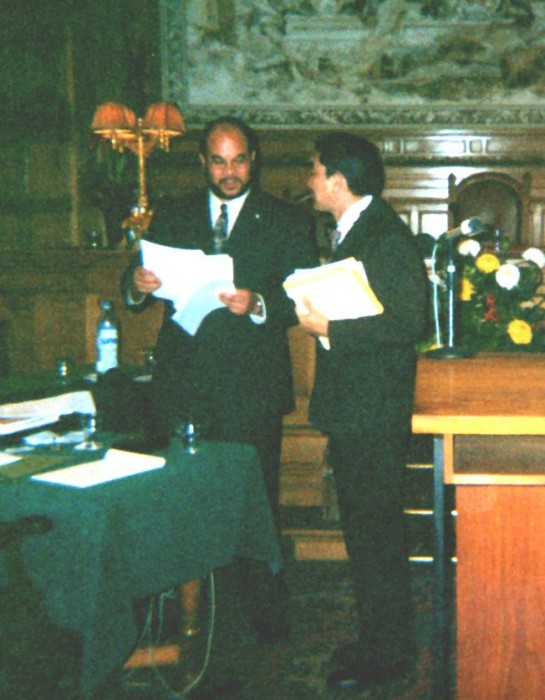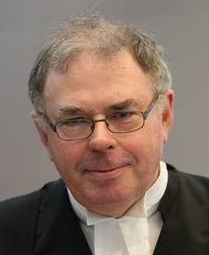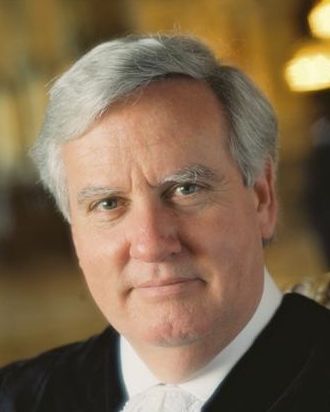https://vimeo.com/17007826
On November 8, 1999, international arbitration proceedings were initiated at the Permanent Court of Arbitration (PCA), The Hague, Netherlands, between Lance Paul Larsen and the acting Government of the Hawaiian Kingdom (Larsen v. Hawaiian Kingdom). The arbitration agreement provided, “The Arbitral Tribunal is asked to determine, on the basis of the Hague Conventions IV and V of 18 October 1907, and the rules and principles of international law, whether the rights of the Claimant under international law as a Hawaiian subject are being violated, and if so, does he have any redress against the Respondent Government of the Hawaiian Kingdom?”
Larsen was arrested on October 4, 1999, in Hilo, Hawai‘i, and imprisoned for 30 days, seven of which were in solitary confinement, for following Hawaiian Kingdom law. Larsen, as the Claimant, alleged that the acting government, the Respondent, was  legally liable to him for allowing the unlawful imposition of American municipal laws over him within the territorial jurisdiction of the Hawaiian Kingdom. In the pleading, Larsen’s attorney, Ms. Ninia Parks, esq., based her case on the following grounds:
legally liable to him for allowing the unlawful imposition of American municipal laws over him within the territorial jurisdiction of the Hawaiian Kingdom. In the pleading, Larsen’s attorney, Ms. Ninia Parks, esq., based her case on the following grounds:
- Mr. Larsen is a Hawaiian subject, with a Hawaiian nationality.
- As a Hawaiian subject, Mr. Larsen is bound by Hawaiian Kingdom law. He is not bound by the laws of the State of Hawaii nor by the laws of the United States of America.
- Mr. Larsen’s rights as a Hawaiian subject have been systematically and continuously denied by the United States of America, the occupying force in the prolonged occupation of the Hawaiian islands by the United States of America. At a minimum, the United States of America has continually denied Mr. Larsen’s nationality as a Hawaiian subject, has illegally imposed American laws over his person, has extorted monetary fines from Mr. Larsen under threat of imprisonment, and has imprisoned Mr. Larsen for asserting his lawful rights as a Hawaiian national.
- The government of the Hawaiian Kingdom has a duty to protect the rights of Mr. Larsen, a Hawaiian subject, despite the continued occupation of the Hawaiian Islands by the United States of America.
- The government of the Hawaiian Kingdom, through its acting Regency, has not fulfilled this duty.
 In its pleading, the acting Government, represented by Dr. Keanu Sai as lead agent, denied the allegations and submitted “that the Claimant’s rights under international law are being violated, but to what extent, is left to the Arbitral Tribunal to decide. That this decision must be made within fixed and established principles and laws pertaining to the matter, and that the Hawaiian Kingdom Government is not liable for redress of these violations under its present conditions as an occupied State.”
In its pleading, the acting Government, represented by Dr. Keanu Sai as lead agent, denied the allegations and submitted “that the Claimant’s rights under international law are being violated, but to what extent, is left to the Arbitral Tribunal to decide. That this decision must be made within fixed and established principles and laws pertaining to the matter, and that the Hawaiian Kingdom Government is not liable for redress of these violations under its present conditions as an occupied State.”
In the American Journal of International Law, vol. 95, p. 928 (2001), and reprinted in the Hawaiian Journal of Law and Politics, vol. 1, p. 83 (2004), Bederman and Hilbert, state that at “the center of the PCA proceeding was…that the Hawaiian Kingdom continues to exist and that the Hawaiian Council of Regency (representing the Hawaiian Kingdom) is legally responsible under international law for the protection of Hawaiian subjects, including the claimant. In other words, the Hawaiian Kingdom was legally obligated to protect Larsen from the United States’ ‘unlawful imposition [over him] of [its] municipal laws’ through its political subdivision, the State of Hawai‘i. As a result of this responsibility, Larsen submitted, the Hawaiian Council of Regency should be liable for any international law violations that the United States committed against him.”
 In February 2000, the PCA’s Secretary General Tjaco T. van den Hout recommended that the acting Government provide a formal invitation to the United States to join in the arbitration. In order to carry out this request by the Secretary General, Dr. Sai was sent to Washington, D.C. Ms. Ninia Parks, attorney for the Claimant Lance Larsen, accompanied Dr. Sai.
In February 2000, the PCA’s Secretary General Tjaco T. van den Hout recommended that the acting Government provide a formal invitation to the United States to join in the arbitration. In order to carry out this request by the Secretary General, Dr. Sai was sent to Washington, D.C. Ms. Ninia Parks, attorney for the Claimant Lance Larsen, accompanied Dr. Sai.
 On March 3, 2000, a telephone meeting with John R. Crook, Assistant Legal Adviser for United Nations Affairs section of the US Department of State, was held. It was stated to Mr. Crook that the “visit was to provide these documents to the Legal Department of the U.S. Department of State in order for the U.S. Government to be apprised of the arbitral proceedings already in train and that the Hawaiian Kingdom, by consent of the Claimant, extends an opportunity for the United States to join in the arbitration as a party.”
On March 3, 2000, a telephone meeting with John R. Crook, Assistant Legal Adviser for United Nations Affairs section of the US Department of State, was held. It was stated to Mr. Crook that the “visit was to provide these documents to the Legal Department of the U.S. Department of State in order for the U.S. Government to be apprised of the arbitral proceedings already in train and that the Hawaiian Kingdom, by consent of the Claimant, extends an opportunity for the United States to join in the arbitration as a party.”
Mr. Crook was made fully aware of the United States occupation of the Hawaiian Kingdom and the establishment of the acting Government. This direct challenge to US sovereignty over the Hawaiian Islands should have prompted the United States to protest the action taken by the Permanent Court of Arbitration in accepting the Hawaiian arbitration case and call upon the Secretary General to cease and desist because this action constitutes a violation of US sovereignty. The United States did  neither. Instead, Deputy Secretary General Phyllis Hamilton notified the acting Government that the United States notified the Court that it will not join in the arbitration, but did request from the acting government permission to access all pleadings and transcripts of the case. Both the acting government and Larsen’s attorney consented. By this action, the United States directly acknowledged the circumstances of the proceedings and the acting government’s representation of the Hawaiian Kingdom before an international tribunal.
neither. Instead, Deputy Secretary General Phyllis Hamilton notified the acting Government that the United States notified the Court that it will not join in the arbitration, but did request from the acting government permission to access all pleadings and transcripts of the case. Both the acting government and Larsen’s attorney consented. By this action, the United States directly acknowledged the circumstances of the proceedings and the acting government’s representation of the Hawaiian Kingdom before an international tribunal.
 Three distinguished jurists presided on the Arbitration Tribunal. Professor James Crawford, SC, served as Presiding arbitrator. Professor Crawford is a professor of international law at the University of Cambridge. At the time of the arbitration, Crawford was also a member of the United Nations International Law Commission (ILC) and was responsible for the ILC’s work on the International Criminal Court (1994) and the Articles on State Responsibility (2001).
Three distinguished jurists presided on the Arbitration Tribunal. Professor James Crawford, SC, served as Presiding arbitrator. Professor Crawford is a professor of international law at the University of Cambridge. At the time of the arbitration, Crawford was also a member of the United Nations International Law Commission (ILC) and was responsible for the ILC’s work on the International Criminal Court (1994) and the Articles on State Responsibility (2001).
 Judge Sir Christopher Greenwood, QC, served as Associate arbitrator. Greenwood was at the time professor of international law at the London School of Economics and Political Science and legal counsel to the United Nations on the Laws of War and Occupation. In 2008, the United Nations elected Greenwood to be judge on the International Court of Justice.
Judge Sir Christopher Greenwood, QC, served as Associate arbitrator. Greenwood was at the time professor of international law at the London School of Economics and Political Science and legal counsel to the United Nations on the Laws of War and Occupation. In 2008, the United Nations elected Greenwood to be judge on the International Court of Justice.
 Dr. Gavan Griffith, QC, served as Associate Arbitrator. Griffith was former Solicitor General for Australia and also served as counsel and agent for Australia in Nauru v. Australia before the International Court of Justice.
Dr. Gavan Griffith, QC, served as Associate Arbitrator. Griffith was former Solicitor General for Australia and also served as counsel and agent for Australia in Nauru v. Australia before the International Court of Justice.
Three days of oral hearings were set for December 7, 8 and 11, 2000 at the PCA. At the center of these proceedings was whether or not Larsen was able to maintain his suit against the acting Government for not protecting him without the participation of the United States who would need to answer to the alleged violations committed by them against Larsen. Larsen was attempting to hold the acting Government responsible for his injuries committed by the United States. In international law, this is a situation called the “necessary and indispensable party” rule and it was the basis of decisions made by the International Court of Justice in Monetary Gold case (Italy v. France, United Kingdom of Great Britain and Northern Ireland and United States of America), the Nauru case (Nauru v. Australia), and the East Timor case (Portugal v. Australia).
In the 2001 Arbitral Award, the Tribunal explained, that it “cannot determine whether the Respondent [the acting government] has failed to discharge its obligations towards the Claimant [Larsen] without ruling on the legality of the acts of the United States of America. Yet that is precisely what the Monetary Gold principle precludes the Tribunal from doing. As the International Court explained in the East Timor case, ‘the Court could not rule on the lawfulness of the conduct of a State when its judgment would imply an evaluation of the lawfulness of the conduct of another State which is not a party to the case.’”
The Tribunal, however, did acknowledge the Hawaiian Kingdom to be an independent State. In its decision, the Tribunal concluded in the Award, “that in the nineteenth century the Hawaiian Kingdom existed as an independent State recognized as such by the United States of America, the United Kingdom and various other States, including by exchanges of diplomatic or consular representatives and the conclusion of treaties.” International law provides for the continuity of the Hawaiian Kingdom since the nineteenth century to the present, which was the basis for the arbitration case in the first place.

Just saw this:
http://www.hawaiiankingdom.info/wp-content/uploads/2014/02/Goodyear-Kaopua-Hawaii-Occupied-Country-2014.pdf
De-occupation or decolonization, is it an option for the U.S. or the Hawaiian Kingdom?
Maybe it’s a decolonization on the part of the U.S. for its inadvertent error (save face)
of occupation on the independent state of the Hawaiian Kingdom; that sounds better!
A hui hou
Thanks for the link. I enjoy reading as many things that are out there when I have time. It’s great to see things that are authored by various scholars and printed in various publications. Knowing that our history and stories are being supplied to particular foreign audiences is somehow therapeutic. Mahalo!
Just wondering if anyone can say what the timeline is for the High Contracting Power, that HK is in negotiations with now? In discussing whether the Red Cross might be the intermediary, it was mentioned that a timeline was mandated, and that they would have a plan in place by March. Now that we know they will not be the entity to negotiate on our behalf, does that mean the new High Contracting Power does or does not have a timeline to follow and will we be made aware of it eventually?
Mahalo for any info.
Yeah I’m getting excited on when such news is gonna hit us! As far as I know, those high contracting parties such as the ICRC and the ICJ are still trying to swallow this information. I honestly have hope that they will eventually understand Hawaii’s situation and will eventually do what is lawfully required of them to do!
The news I’m waiting for above all is when the ICJ, the International Court of Justice, finally takes action! They’ve already recognize Hawaii’s occupation–they just need to take action! According to the other blog post titled “REGISTRAR OF THE INTERNATIONAL COURT OF JUSTICE ACKNOWLEDGES HAWAIIAN COMPLAINT BUT WON’T TAKE ACTION UNTIL HAWAIIAN KINGDOM COVERS COURT EXPENSES”, if I’m understanding this correctly, if the ICJ takes action, they will compel 45 States to stop recognizing Hawaii as “a part of the United States,” but a nation under a foreign occupation. That is according to the “Application Instituting Proceedings and Request for the Indication of Provisional Measures of Protection” receipt which the ICJ has acknowledge! When that happens, the game is up! Its a shame Russia is not in that complaint, but is under the UN Protest and Demand. If Russia where to hear about Hawaii’s occupation, then I guess President Putin’s remarks on the West of “hypocrisy” could be well legally justified! Aloha!
http://www.worldbulletin.net/haber/131361/putin-signs-treaty-to-annex-crimea-accuses-west-of-hypocrisy
Of course that hypocrisy should be towards the United States, not the West entirely. The United States is entirely at fault.
Yes, I was following that thread closely. My understanding, although I’m not sure that 99% of us really understand the end result of the ICJ “decision” by the registrar, was that they were cleaning their hands of the whole thing. I do wish that we could get some sort of “official” or clear answer from HK in regards to that. I realize that HK has stated that monies owed have been collected by virtue of total collection by the US which includes Hawaii’s portion. Also, HK did submit additional monies. However, the last response from the registrar was that “flip-flop” answer where it seemed that they were saying they wouldn’t accept the case, AGAIN. I’m still baffled how a court can accept, decline, accept, decline. That’s what they did or are attempting to do.
Side note:
It’s really wonderful to see how access to all of this historical information has transformed three generations! 20 years ago, we locked classroom doors to even mention the word sovereignty. 40 years before that, confusion reigned supreme. Today, our children are learning daily. It’s that education that will eventually make a change, regardless of anything else.
Mahalo HK for that!!
Anyway, If anyone could be so kind as to update us on a time frame. Are we still looking at a March date for a plan of action from the High Contracting power?
Aloha Iolani, I don’t think the Provisional Measures of protection is limited to just the 45 states. Here’s what the ICJ said the ICJ stated that by “occupying the Territory without title, South Africa incurs international responsibilities arising from a continuing violation of an international obligation,” and that all countries, whether a member of the United Nations or not were “under an obligation to recognize the illegality and invalidity of South Africa’s continued presence in Namibia and to refrain from lending any support or any form of assistance to South Africa with reference to its occupation of Namibia.”
Oh, okay. Well that’s a good sign then!